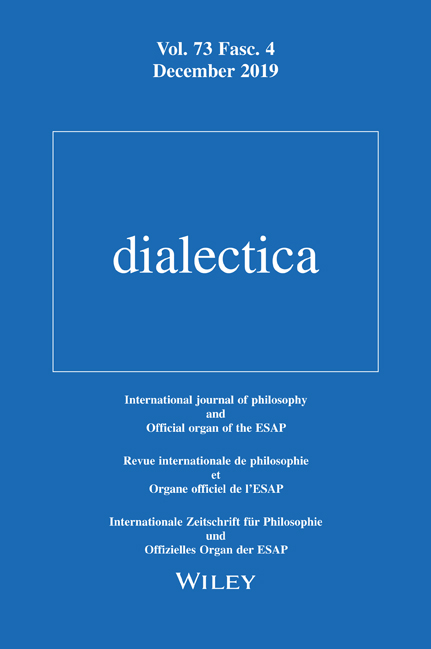Paradigmatology and its Application to Cross-Disciplinary, Cross-Professional and Cross-Cultural Communication
Summary
enParadigmatology as a science of structures of reasoning which vary from culture to culture, from profession to profession, and sometimes from individual to individual is outlined, and communication difficulties between paradigms are discussed. Three paradigms are used as examples: (a) hierarchical, unilateral, homogenistic, universalistic, categorical, classificational, deductive, rank-ordering, competitive paradigm with predetermined universe; (b) individualistic, isolationists, random, nominalistic, atomistic, statistical, probabilistic, egocentric paradigm with thermodynamically and informationally decaying universe; (c) mutualistic, reciprocally interactive, heterogeneity-creating, network-structured, relational, contextual, complementary, symbiotic paradigm with self-generating and self-organizing universe based on mutual causality and post-Shannon information theory.
Paradigmatologie et son Application à la Communication entre des Domaines de Spécialisation différents, entre des Professions et entre des Cultures
Résumé
frCet article présente l'esquisse d'une nouvelle science sur les structures des raisonnement qui diffèrent de culture à culture, de profession à profession, et souvent d'individu à individu. Il traite aussi des difficultés qui se produisent dans la communication entre des structures de raisonnement différentes. Trois structures de raisonnement sont utilisées comme exemples: (a) paradigme hiérarchique, unilatéral, homogéniste, universalité, catégorie, classificatoire, déductif, à ordre vertical, compétitif, avec la cosmologie d'un univers prédéterminé; (b) paradigme individualiste, isolationiste, aléatoire, nominaliste, atomiste, statistique, probabiliste, égoïste, avec la cosmologie d'un univers en dégradation thermodynamique et informationelle; (c) paradigme mutualiste, interactif, producteur d'hétérogénéité, formateur de networks, relationnel, contextuel, complémentaire, symbiotique, avec la cosmologie d'un univers auto-générateur et autoorganisateur basé sur la causalité mutuelle et sur la théorie de l'information post-shannonienne.
Paradigmatologie und ihre Anwendung auf Kommunikation zwischen Wissenschaftsgebieten, zwischen Berufen und zwischen Kulturen
Inhaltsanga.be
deDieser Artikel entwirft Paradigmatologie als Wissenschaft der von Kultur zu Kultur, von Beruf zu Beruf und von Individuum zu Individuum wechselnden Denkstrukturen und erörtert die Kommunikationsschwierigkeiten zwischen verschiedenen Denkstrukturen. Als Beispiele werden drei Paradigmen benützt: (a) hierarchisches, einseitiges, homogenisierendes, universalistisches, kategorisches, einteilendes, deduktives, rangordnendes, auf Konkurrenz orientiertes Paradigma mit vorbestimmtem Universum; (b) individualistisches, isolationistisches, nominalistisches, atomistisches, statistisches, auf Zufälligkeit und Wahrscheinlichkeit beruhendes, auf sich selbst bezogenes Paradigma mit thermodynamisch und informations'theoretisch zerfallendem Universum; (c) gegenseitiges, einander-beeinflussendes, Mannigfaltigkeit erzeugendes, Netzwerk formendes, relationales, kontextbezogenes, ergänzendes, symbiotisches Paradigma mit selbserzeugendem und selbstorganisierendem Universum, das durch eine gegenüber Shannon verbes-serte Version der Informationstheorie begründet ist.




